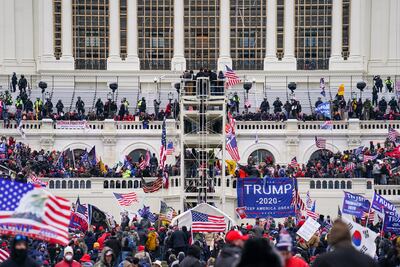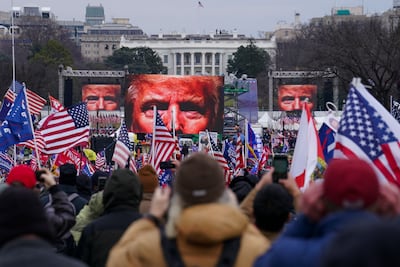Riveting US congressional hearings have been a staple since the end of the Second World War and the introduction of live television. But it has been decades since any testimony was as spellbinding as that of the police officers, who were attacked by the pro-Donald Trump mob that violently sought to prevent the certification of the 2020 presidential election.
It was the first time in US history, including during the Civil War, when the losing side attempted to prevent the winners from accepting their obligations.
Four police officers who were attacked by the mob that assaulted Congress on January 6 testified at the first hearing of a House Select Committee last week. At least 150 officers were injured and one was killed.
It was the most powerful congressional testimony since the Watergate hearings in the early 1970s, eclipsing contentious Supreme Court confirmations, impeachment proceedings against Bill Clinton and, twice, Mr Trump, and even the Iran-Contra arms scandal during the Reagan administration.
Yet not only have the hearings been thoroughly politicised, so has the event itself.
The facts were well understood at the time and are being systematically confirmed. Yet most Republicans are responding with denial and derision.
Many are dismissing it as "political theatre," calling the officers "scripted, rehearsed and phony," and viciously mocking their emotions.
A noted Republican activist labeled one officer a "crisis actor," meaning an impostor, and Fox News' Laura Ingram called them all “political actors."
Yet Republicans are in a difficult predicament.
Immediately after January 6, most key Republican leaders expressed horror at the attack. Many spoke out forcefully against the riot and especially, Mr Trump, whom they held responsible.
Soon enough, though, Senior Republicans like Senate Minority leader Mitch McConnell and House Minority leader Kevin McCarthy capitulated to Mr Trump's leadership. And because Mr Trump cannot be meaningfully disentangled from the January 6 violence, perforce they must defend him and, by extension, the violence itself.


Yet Republicans are profoundly divided.
The most extreme among them express passionate support for the riot, vilify the police, and make a martyr out of the slain rioter Ashli Babbitt. Mr Trump, and representatives Paul Gosar, Andy Biggs, and Marjorie Taylor Green, among others, (several of whom have been implicated in planning the attack by a self-proclaimed insurrection leader, Ali Alexander) are key examples.
The biggest Republican camp, particularly among House leaders, including Mr McCarthy and his deputy Elise Stefanik, effectively treat the attack on Congress as if it were a decontextualised act of nature. The real blame, they insist, belongs to the Democrats and especially House Speaker Nancy Pelosi.
They claim Ms Pelosi had advance warning of the potential for violence and did not do enough to prepare or train the Capitol Police. But Ms Pelosi is not the commander of the Capitol Police force, and most of the missing law enforcement firepower was effectively under the control of the Trump administration.
Many centrist Republicans take the amazing position that January 6 is no longer relevant; that whatever happened then doesn't matter and we must all move on and simply debate the Biden administration.
Most, like Mr McConnell, scorn the hearings as a “partisan exercise”.
Yet immediately after the insurrection, Mr McConnell angrily declared Mr Trump "practically and morally responsible" for the carnage at Congress. Ever since, he has effectively refused to discuss the matter further, including claiming to know nothing about the committee hearing.
Republicans had designated a respected colleague, John Katko, to negotiate an agreement for a bipartisan and independent commission and then rejected his deal with the Democrats.
In truth, they were never going to co-operate with any probe.
Yet, there are two Republican members on the House Select Committee – representatives Liz Cheney and Adam Kinzinger. So, even though Republicans did their best to block any bipartisan process, they purport to be outraged that Ms Pelosi is exercising the sole authority that they forced on her.
Nonetheless, she invited Mr McCarthy to appoint Republican members, which he sought to use to create a partisan spectacle. Two of his five nominees, including Jim Jordan, are vocal supporters of the rioters and major proponents of the lie about the “stolen election”, and could possibly be participants in events or at least are likely material witnesses. Ms Pelosi rightly refused to appoint them to the committee and the three other Republicans boycotted the proceedings. She then appointed Ms Cheney and Mr Kinzinger
Mr Jordan and the others should be subpoenaed by this committee, along with many Trump administration officials, including the former president.
With every passing week, it becomes increasingly evident that Mr Trump’s efforts to overthrow the election results were more far-reaching and insidious than previously known.
He had at least dozens of newly discovered conversations with state leaders and election officials across the country to try to undo the outcome. He also pressured his own government agencies to intervene without cause.
On December 27, he reportedly called senior Justice Department officials and told them to "just say that the election was corrupt, and leave the rest to me" and unnamed congressional allies.
Fortunately, they told him there was absolutely no basis for such a statement and flatly refused.
To this day, he and his supporters, including Mr McCarthy, continue to either say or imply that he is still the legitimate president and, by unavoidable implication, that US democracy is a sham.
Democrats are certainly motivated by partisan interests, but in this case the facts are almost entirely on their side. That is only likely to intensify as the hearings proceed, including questions regarding police preparation.
But that is where the process may become more politically dangerous for the Democrats.
Republicans have adopted a range of positions, from overt support for the insurrection to calculated indifference, that all paint the subject as an egregious, opportunistic and ideological vendetta.
As long as tens of millions of Americans believe some version of that, even a full explication of the truth may not break the illusion.
The hegemony of lies has become so pervasive, especially on the right, that Americans may, in this generation, never be able to develop a shared narrative about one of the worst assaults on their own political system in history.
And most alarmingly, that could become a welcome mat for another, more calculated and competent, effort to overturn a free and fair US election with a large measure of popular support.


